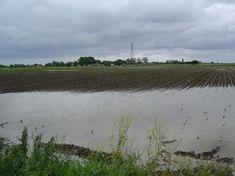
Growers are reporting massive losses following the brutal floods of the past two weeks, and many are now calling on supermarkets to help shoulder part of the burden.
Heavy rainfall has seen losses of up to 50 percent in some pea growing areas, with similar decimation for brassicas, while continued poor weather has offered little respite for beleaguered growers. Soaked soil has even led to damage to glasshouse crops in Yorkshire.
“It’s basically a disaster,” said Richard Hirst, pea grower and chairman of the NFU Board for Horticulture. “This is the third year in a row that things have gone badly in the pea market. Thankfully, we didn’t have as much rain as predicted this weekend, but conditions remain difficult.”
According to Christian Salvesen and the NFU’s Sarah Pettitt, brassicas have suffered badly, with up to half of crops damaged. “There’s wet rot on broccoli and water staining on cauliflowers, and a lot of fields are still underwater,” she told Commercial Grower.
“There are going to be many growers who have put down fields and will be coming up empty- handed. Last season was a severe one - this season is now a crisis.”
Martin Riggall, chief executive of the Processed Vegetable Growers Association, revealed that a survey of PVGA members showed that the most optimistic growers are forecasting a 10 to 15 percent shortfall, while the worst hit areas are predicting 60 to 70 percent crop losses.
Growers are now expressing concern that they will once again be forced to shoulder the burden of a bad season.
While supermarkets have the surety of higher prices at the customer end, growers remain locked into fixed-price contracts.
The PVGA says that its chief worry is that growers will turn their backs on the crop because the price does not cover the cost of growing and harvesting in anything less than a bumper year.
“The UK is recognised around the world as the leading producer of high quality frozen peas but in three of the last four years yield has been reduced by extreme weather patterns that seem to be linked to climate change,” Riggall pointed out.
“We need the whole supply chain to work together to understand each others’ problems in a disastrous situation like this, or we fear the UK industry will collapse. Following a short crop last year supermarkets increased retail prices by around 30 percent, but none of this was passed along the supply chain to help mitigate the losses of the freezing companies and growers.
“We hope retailers will take a longer-term view this time,” he added.
Asked whether supermarkets would intercede to share the burden of a rain-hit harvest, a spokesperson for Sainsbury’s indicated that suppliers were still surveying the extent of the problem. “We haven’t had any direct approach from suppliers about this. But if suppliers are experiencing any problems because of the weather then we would be supportive as we usually are,” she explained.
Several thousand acres remain under water in Yorkshire and Lincolnshire more than a week after the bulk of the floods. Many other crops escaped the flooding but have been seriously damaged by abnormal May and June rainfall.
The excessive rain follows six or seven weeks of heat and drought from late March to early May, which had already put pressure on growers.
Other producing areas on the continent are also understood to be suffering badly. l



